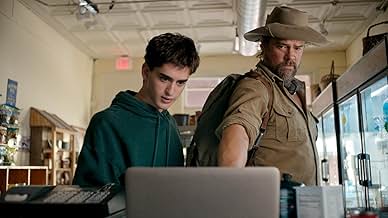One-man films are all the rage, but it's not a new trend. When Westerns were at their peak, there were several stories of a highly trained gunman who had been wronged and was seeking revenge, with actors like Clint Eastwood and John Wayne at the helm. In the 1980s and 1990s, action stars like Arnold Schwarzenegger, Sylvester Stallone, Bruce Willis, and Jean-Claude Van Damme starred in films about a guy seeking revenge for personal, professional, or nationalistic reasons. And while mainstream cinema shied away from such narratives for a while until Keanu Reeves became John Wick, that trend was kept alive by direct-to-video releases from immensely talented artists like Scott Adkins, Marko Zaror, and Michael Jai White. Recently, familiar faces like Orlando Bloom, Tom Hardy, Jamie Foxx, Eddie Murphy, Ryan Gosling, Chris Evans, and Jennifer Lopez have entered this space and achieved varying degrees of success. Josh Duhamel has been trying to do the same thing for five or six years, and with Off the Grid, he finally succeeds.
Off the Grid by Johnny Martin, written by Jim Agnew, tells the story of Jack, who lives in obscurity in Memphis, Tennessee. He has a heavily guarded bunker that seems impregnable, but isn't. He owns a dirt bike that he regularly uses to travel to the aforementioned town and resupply. He tries not to talk to many people, but a budding scientist, Chase, and a bartender, Josey, take a shine to him for reasons no one understands (not even the audience). But why does Jack live like this? Well, 19 or 20 years ago, Jack worked for a company called Belcor Industries.
Director: Johnny Martin
Writer: Jim Agnew
Stars: Josh Duhamel, Greg Kinnear, María Elisa Camargo
He sensed something fishy was going on there. So he broke out of prison with all his research, dashing Belcor's dreams of doing something truly "revolutionary." Since then, Belcor has been determined to get Jack back and force him to finish his project. However, when a hack leads to the leak of confidential data online, Belcor tasks Jack's former colleague, Ranish, and security chief, Marcus, with tracking him down at all costs. So, it's the high-tech weaponry of Belcor's army versus Jack's homemade munitions. Who will win and who will lose? Well, that's what the film is about.
I realize that digital television movies aren't exactly known for their wealth of themes, metaphors, and symbolism. But that won't stop me from giving an unnecessarily superficial analysis of what Off the Grid is "really" about. At its core, Agnew's take on the stories of yesteryear is about ethics and the price one pays for being moral today. It may seem a bit extreme for a tech company to send armed mercenaries after its employee to protect their secret, but I implore you to read the news and see that real life is stranger than fiction. Without naming names (to avoid a lawsuit), there are multinational corporations known for killing whistleblowers and then making it look like suicide.
The only exaggeration in Agnew's script is that his upstanding whistleblower is a mix of Tony Stark and John Rambo; therefore, he knows how to defend himself by taking advantage of the remote nature of a remote town. Where the film falters is in its failure to properly develop Jack's transformation from a man who loves solitude to a warrior willing to risk his life and his research to save innocent people. There were plenty of opportunities to do so, but Agnew didn't take advantage of them. Martin and Agnew do a good job of highlighting the prevailing classism in the vocabulary of the city's people and their prejudices toward their fellow citizens simply for not keeping up with the latest trends in fashion and technology.
Everything about the production design, art direction, costume design, and shot selection used to depict San Francisco and Memphis in Off the Grid shows how complicated the city's people have become. And yet, they have the audacity to look down on those who, unlike them, don't actively contribute to the deterioration of the environment and social values. That's not integral to the film's plot, but I think this kind of thing enriches the fundamental conflict between Jack and Belcor's henchmen. Technically, there are some good chase sequences, including one with a character named Chase. Everything involving the booby traps and homemade weapons is great. The hand-to-hand combat sequences are fine; they could have been better, but they get the job done. The music is generic, but when combined with the cinematography and editing, it didn't bother me too much. It does have a pretty weak end-credits sequence, though. What the hell happened there?
The performances in Off the Grid are truly astonishing. Josh Duhamel aptly portrays the weight of the burden his character has carried for nearly two decades. There are no flashbacks to help him. Even the expository dialogue isn't expository enough to compensate. He has to express everything through his body language and vocal inflections, and he does it very well. Greg Kinnear is excellent at expressing his frustration.
By the end, it's a real laugh. Ricky Russert gave off a "Severus Snape in the wild" vibe. If I'm not mistaken, I think that's exactly what the filmmakers were going for. Russert is very animated and injects a lot of life into the film; I just wish we could learn more about why Marcus is the way he is. Peter Stormare, Maria Elisa Camargo, Michael Zapesotsky, and the rest of the supporting cast are great. In short, yes, it's worth watching every once in a while. I mean, at the very least, it's better than all those multi-million dollar fictional movies streaming platforms keep releasing and hailing as the Second Coming of Christ. Off the Grid knows exactly what it's about, and from the first frame to the last, it remains committed to entertaining you with cheap thrills.

Comments
Post a Comment